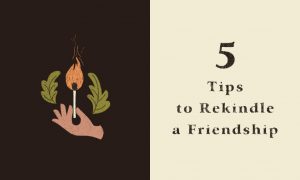How God Restored a Strained Friendship
R and I are the same age, and we were often classmates in primary and secondary school. When I first started going to church and youth fellowship, we were in the same Bible Study group. We were even baptised on the same day.
She was, it seemed to me, the perfect “church girl”. A talented singer with a vivacious personality, she easily found areas of ministry to serve in and was unanimously embraced by the church community as a future leader.
By contrast, I struggled to fit in despite my best attempts. I was too quiet, and my interests were too different. And in an environment where she was constantly in demand, there didn’t seem to be room for someone like me.
Perhaps this was due to my nature as an introvert, but since I didn’t feel like I was welcome in her “crowd”, I backed off and ensconced myself within a different group of friends that felt more “accessible” to me.
Years passed, and R and I stopped being part of the same Bible Study group. She continued to serve in the youth ministry, while I transitioned to our church’s adults fellowship. We were still friendly with each other, though we didn’t know each other as well as we used to.
Then I didn’t get an invite to her wedding.
The bitter root
While we didn’t run in the same circles anymore, R and I had a lot of mutual friends by virtue of our school and church connections. And two of those friends innocently revealed that they had received their invites while I was having dinner with them.
While I acknowledged that R and I were no longer close, I had assumed that I was at least invited to her wedding. After all, it seemed like everyone in the church was, and R and I did have history as former Bible Study groupmates, and I thought we were at least friendly acquaintances.
The admission that I hadn’t gotten my invite cast an awkward pall over the dinner, and the seed of bitterness was planted.
R did reach out with an invite later on. I had a family event scheduled on the day of the wedding and so could not have attended, but I found myself thinking, I could have made time for it if I had known earlier. As the bitterness took root, I heeded the whispers of pride that said she had only issued a “pity invite”, and that I should want no part of that.
So I started avoiding her. I felt wounded, and pride kept me from being honest and actually talking to her about it. In fact, it would be several years before I would talk to her again at all.
A praying friend
At the time I was nursing the rift between R and myself, my best friend was in a Bible Study group with R. My best friend would mention R every so often, and while I didn’t stop her from doing so, I didn’t particularly like hearing it. R was in seminary by this time and training to be a pastor; and my bitterness was at the point where I privately wondered whether she was fit to be a pastor at all.
But my best friend was seeing sides of R that I wasn’t getting to see, and she perceived that we could actually be good friends. And so she hoped, and she prayed. It was a hope that was seemingly misplaced when nothing happened for years.
Then my grandmother landed in the hospital due to an infection, and was eventually diagnosed with dementia and depression. God was about to answer my best friend’s prayer in a powerful way.
The thawing
I looked for someone from the church who could visit my grandmother and minister to her. Almost everyone I asked pointed me to R, telling me that she had lived with a grandmother with dementia for years—something I didn’t know. I didn’t want to approach her, so I kept looking. But I also didn’t want to see my grandmother and family members struggling any longer, so one day, I finally clenched my teeth and asked to talk to R.
To my surprise, she immediately offered to schedule a visit to my grandmother’s. While there, R sang songs to my grandmother, showed videos of her son, and talked to my grandmother about Jesus. It was then that the scales began to fall from my eyes.
I saw R’s graciousness, patience, and humility in the way she conducted herself around my relatives. I remember them telling me afterwards how courteous and kind they found her, even though they aren’t believers and had initially resisted the idea of her visiting. And as I walked R back to her home after the visit, I realised that I was having an easy time talking to her and we were getting along very well.
That day marked the start of a restoration. As I continued to deal with my grandmother’s condition, R and I would often talk about it, and she would pray for my family and offer sound advice on issues she had dealt with before. I learned to respond in kind and to ask her how she wanted to be prayed for, and in the process, I saw just how little I had known about her.
The humbling
My relationship with R improved, and over the years, we found opportunities to serve together in church, even at one point collaborating on putting together Bible Study material for our congregation. And even though I had once questioned her fitness to be a pastor, I was quickly disproved—I found myself deeply blessed by her sermons and admiring the way she was helping to lead our flock.
With this, God finally had the opening into my heart that I hadn’t allowed Him before. He showed me how this whole time, R had never been the problem: I was. I had allowed pride and bitterness to construct an image of her that wasn’t true just because I felt slighted.
And even that “insult” of not receiving the wedding invite “on time” had been misplaced: I hadn’t made the effort to be a good friend to her for years, yet I had felt entitled to be a part of her big day? I wouldn’t have invited me either.
Still, I never told R any of this. Until the day God impressed in my heart that I should tell our friendship story.
The talk
Recently, I was reading Dee Brestin’s book The Friendships of Women. As I pondered its anecdotes about beautiful yet challengingly complex friendships among Christian women, it occurred to me that R and I had what could be a very encouraging friendship story, especially for those who have fractured relationships with fellow members in church. We were living proof that in Jesus, there is always hope for reconciliation and restoration.
I thought of writing it for this platform, to share about God’s grace toward us. But just as quickly, I became very aware that if I wanted to tell our story, I was going to need R’s blessing. Yet. . . how do you tell someone who has become a wonderful friend and sister in Christ that you once deeply disliked her?
I certainly didn’t want to open that can of worms, so I put the idea on the shelf. But God didn’t want me to forget about it, and He prodded me again to get it done. So I finally reached out—through chat, of all places. I was hoping it would be a simple, short conversation where I asked, she said yes, and that was that.
It wasn’t. R had no idea I had felt that way about her—I felt terrible for having brought it up and wished at several points that I had just dropped this. But as the conversation went on, I saw that we were speaking truth to each other in the process, and it was setting us free in different ways.
I learned that during the period when we weren’t close, there was an instance when she saw someone at church treating me poorly, and she was offended for me. It was so long ago, I didn’t even remember that it happened at all, but the fact she remembered it even today touched me.
I also learned that she had experienced her own share of not feeling like she fit in too. And she assured me that she really did have me on the guest list for her wedding and it wasn’t a pity invite—she had simply thought that since she was outside my close-knit circle, when I got the invite wasn’t that big a deal to me.
Each of us had mistakenly thought for years that we didn’t really matter to the other. By God’s grace, we finally had the opportunity to tell each other that we mattered to each other. Though the conversation was difficult, we came away even closer than before.
Ephesians 4:31-32 tells us, “Get rid of all bitterness, rage and anger, brawling and slander, along with every form of malice. Be kind and compassionate to one another, forgiving each other, just as in Christ God forgave you”.
I believe bitterness kicked off the list for a reason—because Paul knew the kind of damage even just a little of it could do to a church. But we can be thankful that through Christ, nothing is beyond healing and reconciliation. When God’s love is at work in us, friendships can be reborn and restored.

















Leave a Reply
Want to join the discussion?Feel free to contribute!